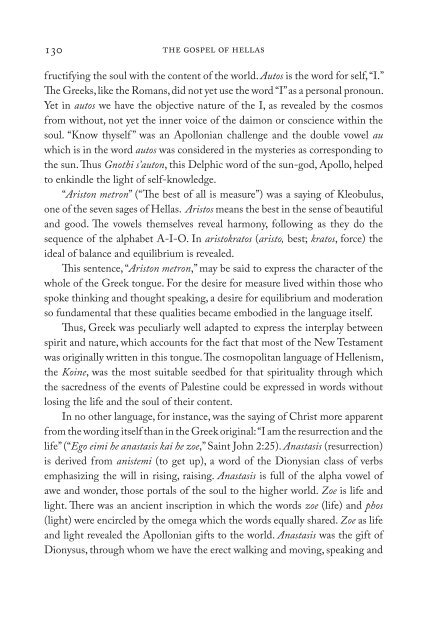The Gospel of Hellas - Research Institute for Waldorf Education
The Gospel of Hellas - Research Institute for Waldorf Education
The Gospel of Hellas - Research Institute for Waldorf Education
Create successful ePaper yourself
Turn your PDF publications into a flip-book with our unique Google optimized e-Paper software.
0 the gospel <strong>of</strong> hellas<br />
fructifying the soul with the content <strong>of</strong> the world. Autos is the word <strong>for</strong> self, “I.”<br />
<strong>The</strong> Greeks, like the Romans, did not yet use the word “I” as a personal pronoun.<br />
Yet in autos we have the objective nature <strong>of</strong> the I, as revealed by the cosmos<br />
from without, not yet the inner voice <strong>of</strong> the daimon or conscience within the<br />
soul. “Know thyself ” was an Apollonian challenge and the double vowel au<br />
which is in the word autos was considered in the mysteries as corresponding to<br />
the sun. Thus Gnothi s’auton, this Delphic word <strong>of</strong> the sun-god, Apollo, helped<br />
to enkindle the light <strong>of</strong> self-knowledge.<br />
“Ariston metron” (“<strong>The</strong> best <strong>of</strong> all is measure”) was a saying <strong>of</strong> Kleobulus,<br />
one <strong>of</strong> the seven sages <strong>of</strong> <strong>Hellas</strong>. Aristos means the best in the sense <strong>of</strong> beautiful<br />
and good. <strong>The</strong> vowels themselves reveal harmony, following as they do the<br />
sequence <strong>of</strong> the alphabet A-I-O. In aristokratos (aristo, best; kratos, <strong>for</strong>ce) the<br />
ideal <strong>of</strong> balance and equilibrium is revealed.<br />
This sentence, “Ariston metron,” may be said to express the character <strong>of</strong> the<br />
whole <strong>of</strong> the Greek tongue. For the desire <strong>for</strong> measure lived within those who<br />
spoke thinking and thought speaking, a desire <strong>for</strong> equilibrium and moderation<br />
so fundamental that these qualities became embodied in the language itself.<br />
Thus, Greek was peculiarly well adapted to express the interplay between<br />
spirit and nature, which accounts <strong>for</strong> the fact that most <strong>of</strong> the New Testament<br />
was originally written in this tongue. <strong>The</strong> cosmopolitan language <strong>of</strong> Hellenism,<br />
the Koine, was the most suitable seedbed <strong>for</strong> that spirituality through which<br />
the sacredness <strong>of</strong> the events <strong>of</strong> Palestine could be expressed in words without<br />
losing the life and the soul <strong>of</strong> their content.<br />
In no other language, <strong>for</strong> instance, was the saying <strong>of</strong> Christ more apparent<br />
from the wording itself than in the Greek original: “I am the resurrection and the<br />
life” (“Ego eimi he anastasis kai he zoe,” Saint John 2:25). Anastasis (resurrection)<br />
is derived from anistemi (to get up), a word <strong>of</strong> the Dionysian class <strong>of</strong> verbs<br />
emphasizing the will in rising, raising. Anastasis is full <strong>of</strong> the alpha vowel <strong>of</strong><br />
awe and wonder, those portals <strong>of</strong> the soul to the higher world. Zoe is life and<br />
light. <strong>The</strong>re was an ancient inscription in which the words zoe (life) and phos<br />
(light) were encircled by the omega which the words equally shared. Zoe as life<br />
and light revealed the Apollonian gifts to the world. Anastasis was the gift <strong>of</strong><br />
Dionysus, through whom we have the erect walking and moving, speaking and

















